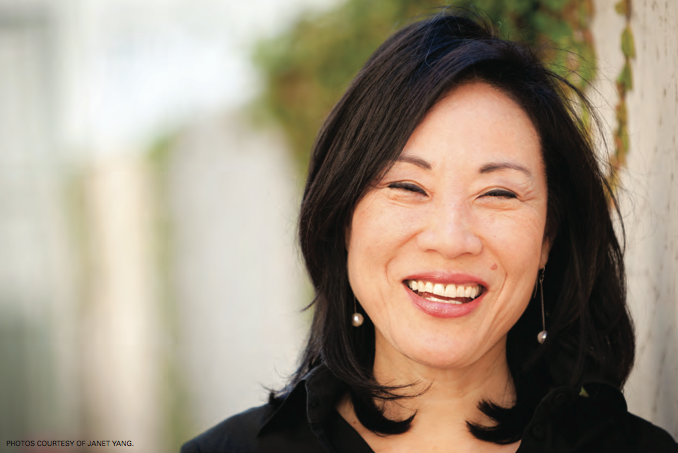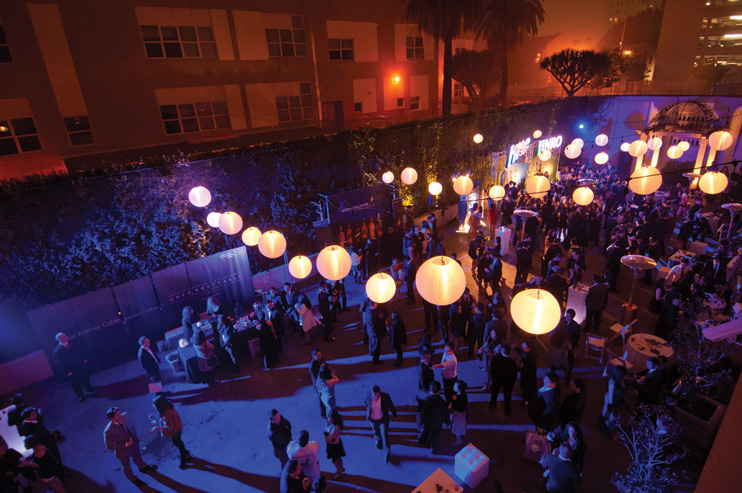Story by Ada Tseng.
Janet Yang remembers every little detail about her first trip to China as a teenager in 1972 during the Cultural Revolution: the flight to Hong Kong (because there were no direct flights to China at the time); the rickety bridge they had to walk across to get to Shenzhen; the giant Samsonite suitcases of flour, sugar and rice they brought for their relatives, whom her mother hadn’t seen in over a decade (being careful not to go over the import quota); the little old lady porters with bound feet who hoisted up these giant suitcases on their shoulders; the military songs blaring over loudspeakers; the interrogation at the border; the flood of relatives that came from all over the country to meet them at the train station in Canton; her relatives’ fascination over shower caps and contact lens cases (they hadn’t seen plastic toiletries before); and her cousin’s textbooks she flipped through that read, “Down with American imperialists!”
This was soon after the famous Nixon-Kissinger trip to China, the first time an American president had visited and a symbol that ended 25 years of separation between the two countries. Yang’s parents were part of a generation who came abroad to the United States for school in the ’50s, with every intention of returning to China – until the Cultural Revolution happened and the government started targeting intellectuals. Suddenly it didn’t seem safe for them to return. Though the United Nations ambassador from China was now encouraging American visitors, many were still fearful.
“At the time, it was such a big deal, even for overseas Chinese, to go back to China,” says Yang. “It was a very, very mysterious place, because it had been so cut off for so long, so much so that my parents decided we shouldn’t even all go together. They split us up – my mom and I went first; my father, brother and sister went on a separate trip – because the mentality at the time was: ‘If we all go together and get stuck there, who would help us get out?’ It was like a big black hole back then.”
Today, Yang is a successful film producer who is widely considered the go-to person for Hollywood industry professionals who want to tap into the exponentially growing China market. And nowadays, that’s a lot of people. BofA Merrill Lynch Global Research recently estimated that by 2017 the China box office could yield $5 billion annually for Hollywood studios, compared to $2.2 billion today.
“To me, to have experienced this dramatic shift in one lifetime is amazing,” says Yang. “Everything’s topsy-turvy now. It used to be such a big deal for us to bring over sunglasses and watches to China. Now, they’re buying up our country. When Chinese people come to the U.S., they just want to shop, because they can’t believe how cheap everything is. It’s so weird.”
Yang calls her 1972 trip to China a life-changing moment. “Before, I was really just an American kid growing up in a Jewish neighborhood,” she says, “and then the world opened up.” She immediately started learning Chinese, and once she got to college – she was a student at Brown and a visiting student at Harvard – she asked all her teachers to look out for opportunities for her to move to China. Ironically, her parents were dismayed. What would she do with a Chinese studies degree? At the time, it seemed to have no practical application whatsoever.
She moved to Beijing in the early ’80s, as part of the first wave of American expats going to China, and she worked at the Foreign Languages Press Office. The Cultural Revolution had just ended, and it was a fascinating time for experimentation.
“The most interesting thing for me was that artists were coming out of the woodwork,” remembers Yang. “After being fed one thing for so long, writers and filmmakers were trying to create [art], and I was so taken by their bravery. I realized I was carrying all these biases about what we could do, because the images of Chinese onscreen [in America] were so horrible, and it was the first time I realized, ‘We can make things.’ Even if it was a bad movie, it was still exciting.
[wp_ad_camp_1]
“That’s when I decided that film was important,” she continues. “In the beginning, I just wanted people outside of China to see these Chinese films. I figured it was a good way to introduce them to China and also see Chinese people in a different light. I wanted people to have the same experience that I had.”
She returned to the U.S. to get her M.B.A. and was then hired to run World Entertainment, a company in San Francisco that imported and distributed films from Hong Kong and China. Eventually, she was hired at universal to help open up the China market, and that’s when she met a lot of Chinese filmmakers early in their careers, including Zhang Yimou and Chen Kaige, and introduced them to other Hollywood executives.
The first time Yang worked on a film in China was in 1986, for Steven Spielberg’s Empire of the Sun, starring a 13-year-old Christian Bale. They were in Shanghai while Bernardo Bertolucci’s The Last Emperor was shooting in Beijing, and with two high-profile films being simultaneously shot in China, they all recognized they were part of a groundbreaking moment in history.
“People were clueless about China back then,” says Yang. “I mean, they’re still clueless now, but really clueless then.” Yang helped set up a system for Hollywood to work in China. She knew there needed to be a bilingual person who understood American filmmaking working with the head of each major department. At the time, the first crop of Chinese students were coming out of UCLA film school, and Yang gave many of them their first opportunity to work on a major Hollywood studio project. She and her team spent months in China, getting all the permits and laying the groundwork so that once Spielberg arrived, he could quickly work his magic.
Now a veteran with an extensive understanding of both the American and Chinese movie industries, Yang has served as president of Ixtlan, a production company she formed with Oliver Stone, for seven years; was instrumental in the productions of Dragon: The Bruce Lee Story and The Joy Luck Club, two rare Hollywood films with Asian American leads; and was sought out by Disney to produce High School Musical: China, the first time a global franchise was made specifically for the Chinese market.
But it all came full circle in 2012 with the production of Shanghai Calling, directed by Daniel Hsia and starring Daniel Henney as a Chinese American lawyer who is sent to Shanghai on business. It gave her the opportunity to help tell a story about contemporary China, one that showcased why she loves splitting her time between the U.S. and China – and why she dedicates herself to not only being a film producer but a cultural ambassador who can bridge the gap between two very different countries.
“If it weren’t for China, I’m not sure if I’d even still be producing,” says Yang. “It’s such a wild and woolly world out there these days. I grew up in a Hollywood where it was easier to make films. I know I have some supposedly impressive credits, but I couldn’t make any of those films today. Not one. So everything has a time, and it’s really just about trying to keep up without losing yourself. China has opened up a lot of different opportunities, so I’m happy I’ve stuck around long enough to do this.”
This story was originally published in our Winter 2013-14 issue. Get your copy here.








